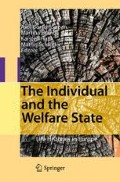Abstract
Parental socio-economic background plays an important role in determining employment outcomes during the individual’s whole life-cycle. Indeed, the environment in which individuals grow up plays a crucial role in determining their later socio-economic condition, regardless of their own abilities. On the one hand, this link might be due to the transmission of social norms (e.g. work ethics) or risk attitudes from parents to children. On the other hand, public policies may strengthen or weaken cross-generational persistence in the socio-economic status.
Access this chapter
Tax calculation will be finalised at checkout
Purchases are for personal use only
References
Barro, R. J., & Lee, J. -W. (1997). Schooling quality in a cross section of countries. NBER Working Paper No. W6198, September.
Barro, R. J., & Lee, J. -W. (2000). International data on educational attainment: updates and implications. CID Working Paper No. 042, April.
Christelis, D., Jappelli, T., Paccagnella, O., & Weber, G. (2009). Income, wealth and financial fragility in Europe. Journal of European Social Policy, 19(4), 359–376.
EGREES. (2003). Equity of the European educational systems: a set of indicators. Liège: Department of Theoretical and Experimental Education, University of Liège.
European Commission (2010). Europe 2020 Plan. available at URL:http://ec.europa.eu/news/economy/100303_en.htm)
Foshay, A. W., Thorndike, R. L., Hotyaat, F., Pidgeon, D. A., & Walker, D. A. (1962). Educational achievements of thirteen-year-olds in twelve countries. Hamburg: UNESCO Institute for Education, International Studies in Education.
Garrouste, C. (2010). 100 Years of educational reforms in Europe: a contextual database. Luxembourg: Publications Office of the European Union, EUR 24487 EN.
Mayer, S. E. (2010). The relationship between income inequality and inequality in schooling. Theory and Research in Education, 8(1), 5–20.
OECD (2008). Growing unequal – income distribution and poverty in OECD countries. Paris: OECD Publications.
OECD (2010). Economic policy reforms: going for growth. Paris: OECD Publications.
Author information
Authors and Affiliations
Corresponding author
Editor information
Editors and Affiliations
Rights and permissions
Copyright information
© 2011 Springer-Verlag Berlin Heidelberg
About this chapter
Cite this chapter
Cavapozzi, D., Garrouste, C., Paccagnella, O. (2011). Childhood, Schooling and Income Inequality. In: Börsch-Supan, A., Brandt, M., Hank, K., Schröder, M. (eds) The Individual and the Welfare State. Springer, Berlin, Heidelberg. https://doi.org/10.1007/978-3-642-17472-8_3
Download citation
DOI: https://doi.org/10.1007/978-3-642-17472-8_3
Published:
Publisher Name: Springer, Berlin, Heidelberg
Print ISBN: 978-3-642-17471-1
Online ISBN: 978-3-642-17472-8
eBook Packages: Humanities, Social Sciences and LawSocial Sciences (R0)

